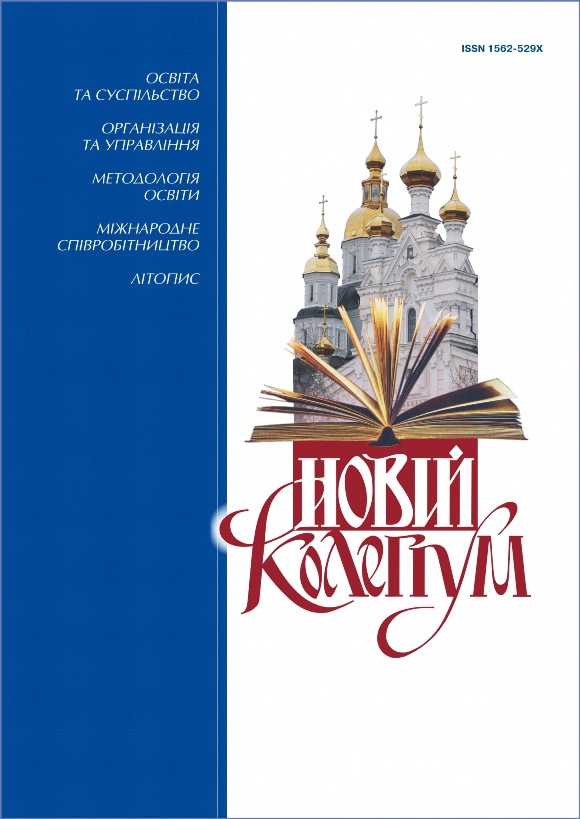Evolution of methods of teaching foreign language and prospects for foreign language education
DOI:
https://doi.org/10.30837/nc.2021.3.47Keywords:
methods of teaching a foreign language, intercultural communication, cognitive linguistics, interdisciplinary approachAbstract
The article substantiates relevance of improving methods of teaching foreign language in order to meet social needs, which are determined by the fact that communication in a foreign language environment has now become an important component of a specialist's professional culture. The subject of research is history of development and change of methods of teaching foreign languages. A brief description of methods which were used in different historical periods is given in terms of goals and expected learning outcomes. Relationship between historical development of teaching methods and change in comparative-historical, system-structural and anthropocentric (linguo-cognitive) paradigms in linguistics as theoretical basis of methodology of teaching foreign languages is considered. The urgency at the present stage of changing technology and principles of teaching foreign languages has been substantiated, ultimate goal of which should be formation of ability for effective intercultural communication. The conclusion is made about prospects for development of modern teaching methods, which should be based on the linguo-cognitive paradigm, i.e. consider language as a multicomponent means of human communication, and also take into account the latest achievements of cognitive linguistics, cultural linguistics, theory of intercultural communication. This will improve methods of teaching foreign language, purpose of which will be to form a linguistic personality that is able to overcome linguistic and cultural barriers, to carry out pragmatically effective communication with representatives of other cultures, criterion of which is not only understanding, but also productivity, achievement of mutually beneficial results.
References
Раушенбах В. Э. Краткий обзор основных методов преподавания иностранных языков с I по XX век. Москва : Высш. шк., 1971. 112 с.
Рахманов И. В. Очерк по истории и методике преподавания новых западноевропейских иностранных языков. Москва : Учпедгиз, 1947. 196 с.
Миролюбов А. А. История отечественной методики обучения иностранным языкам. Москва : ИНФРА-М, 2002. 448 с.
Ведель Г. Е. Соображения об истории отечественной методики обучения иностранным языкам // Вестник ВГУ. Серия «Лингвистика и межкультурная коммуникация». 2003. № 2. С. 66 – 84.
Щукин А. Н. Обучение иностранным языкам. Теория и практика : учеб. пособие для преподавателей и студ. Москва : Филоматис, 2006. 480 с.
Щерба Л. В. Преподавание иностранных языков в средней школе: общие вопросы методики ; под ред. И. В. Рахманова. Изд-е 2-е. Москва : Высш. шк. 1974. 112 с.
Ведель Г. Е. Развитие сознательно-практического метода и становление факультета РГФ // Вестник ВГУ. Серия «Лингвистика и межкультурная коммуникация». 2003. № 1. С. 94 – 110.
Беляев Б. В. Очерки по психологии обучения иностранным языкам. 2-е изд. Москва : Просвещение, 1965. 229 с.
Пассов Е. И. Основы коммуникативной методики обучения иноязычному общению. Москва, 1989. 276 с.
Кунанбаева С. С. Современная теория и практика иноязычного образования. Алматы, 2010. 350 с.
Верещагин Е. М., Костомаров В. Г. Язык и культура: Лингвострановедение в преподавании русского языка как иностранного. Москва, 1990. 246 с.
Hall E. T. Beyond culture. New York: Anchor Books, Doubleday, 1989. 298 р.
Trager G. L. Language and Languages. Chandler Publishing Company, 1972 – 378 p.
Ведель Г. Е. Методы обучения иностранным языкам и их методологическая основа // Вестник ВГУ. Серия «Лингвистика и межкультурная коммуникация». 2001. Вып. 1. С. 85 – 91.

